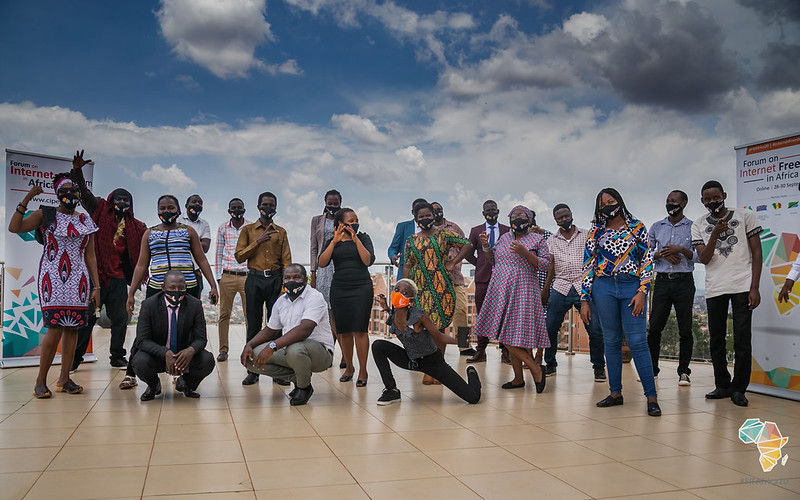#FIFAfrica20 |
Day two of the Forum on Internet Freedom in Africa 2020 (FIFAfrica20) has wound down, with yet more engagement, experience sharing, skills building, assembly of thought leadership, insights and opinions on digital rights from across the continent and beyond.
The third and final day will be just as inspiring, kicking off with a dialogue on internet accessibility for persons with disability during Covid-19 at the remote hub in Abidjan, Côte d’Ivoire. Virtually, discussions on inclusion of persons with disability in the digital society will see GSMA host a talk on digital assistive technologies in low and middle income countries in Africa and Asia. Based on a landscape study, GSMA’s session will highlight the characteristics of the digital inclusion of women with disabilities including opportunities for innovators, the mobile industry and other stakeholders. On the first day of FIFAfrica, CIPESA explored how the telecommunications sector has largely excluded persons with disabilities from their service offerings in many African states.
Further on non-discrimination online, a collaborative session exploring where African women are placed – or left out of – on the internet will navigate a series of issues including imagining inclusive gender connectivity, the implications of Covid-19 on online African feminist movement building through to feminist research and the roles these are playing in the digital rights movement.
Internet users that are able to overcome discrimination and access barriers are faced with more challenges – among them the spread of false and misleading information online. Indeed, disinformation has come to play a concerning role on the internet, often fuelled by limited digital literacy and/or increasingly sinister motives. Media Monitoring Africa (MMA) will host a session on exploring how disinformation causes harm, undermines democracy, spreads fear, anxiety and deepens exclusion. In particular, MMA’s session will focus on the role that platforms should play in ensuring that public interest is maintained in efforts to combat disinformation online.
Meanwhile, Global Partners Digital (GPD) will highlight government responses to disinformation in Africa over the past decade including during the heightened context of the Covid-19 pandemic. Drawing on expertise from Africa-based civil society groups that have jointly developed a disinformation policy tracker to track and analyse disinformation laws, policies and patterns of enforcement across Sub-Saharan Africa, the GPD session, which will also feature academia and private sector representatives, will advocate for a shift towards a more rights-respecting and evidence-based approach to combating disinformation online.
As deployment of Artificial Intelligence (AI) across the world gains momentum, its impacts are far-reaching. Yet still, conversations around responsible AI, have generally excluded the global south and in turn, this is likely to have consequences in the way in which AI technologies are designed, developed, and deployed for the region! The session will call for the decolonisation of AI in Africa and explore the need for inclusivity of more stakeholders in the development of AI in Africa.
The Centre for Human Rights, University of Pretoria will unpack the right to privacy within the revised Declaration of Principles on Freedom of Expression and Access to Information in Africa. AccessNow, the #KeepItOn coalition lead will amplify the diverse strategies being employed by activists, journalists, technologists, individuals among others to fight against the worrying trend of increased internet shutdowns around the world. The session will build on day one and two of FIFAfrica20 engagements including catalysts for collaboration in digital rights strategic litigation.
Furthering the topic of strategic litigation, a Media Defence session will also outline experiences of strategic litigation in the context of digital rights. The goal is to allow litigators to discuss with internet freedom and freedom of expression communities the practical realities of litigating digital rights, often against a hostile political backdrop. Media Defence will also use the session to develop relationships and widen its collaboration with other organisations that may benefit from legal expertise and/or financial support in these cases.
The tone for the close of FIFAfrica20 will be set by the presentation of the African Internet Rights Alliance (AIRA), a coalition of civil society organisations working to advance digital rights in all aspects of life, governance and the economy on the continent. The AIRA session will share insights into the Alliance’s work over the past three years and discuss the need for transnational collaboration, partnerships and coalition-building to protect and expand digital rights across Africa.
Find the report here.

